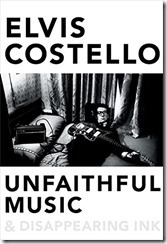I still remember my first encounter with Elvis Costello’s music. It was the John Peel show on the radio of course, the song was Less than Zero, and I found it captivating: distinctive voice, catchy melody, and above all words that were evocative, mysterious and vaguely menacing even though I didn’t fully understand them. I snapped up the album My Aim is True when it was released a few months later and have been a fan ever since, following the twists and turns of his career from punk rock to R&B to country to collaborations with jazz, classical and hip-hop musicians.
Costello is an amazing wordsmith and songs pour out of him, such that many of his B sides and outtakes are more than equal to the best work of many others, a characteristic he shares only I think with Bob Dylan – who makes a regular appearance here as they encounter each other and end up performing together on a number of occasions.
Now this is his book, 36 chapters (plus postscript) and approaching 700 pages. It is an excellent read, presuming you have some time for the man or an interest in the music scene of the last forty or so years. Writing in short pithy paragraphs (just as you would expect) Costello tells the story of his life, his bands, his writing, his father Ross MacManus who was also a singer, girls girls girls, and along the way recounts many entertaining and often alcoholic incidents of life on the road.
The rhythm of the book is somewhat staccato and the sequence of events is only loosely chronological – that is, there is more about his earlier years in the first half of the book, and more about his later years in the second, but he constantly jumps back in forth in time making literary counterpoints. His habit of ending an anecdote just when you thought it was getting going can be annoying; but he is never dull.
It would be an interesting exercise to rearrange, or attempt to rearrange, the book into chronological order, but I don’t fancy doing it with my printed copy.
There are black and white photos interspersed throughout the book; they don’t look great partly because they are printed on paper designed for text. In addition they have no captions. A shame.
Costello writes a lot about his father, and in some ways the book is a tribute to him. He writes of his statement a couple of years ago that he would give up making records, which at the time he said was about spending more time with his children. “The real reason was that I needed time to imagine how I could bear to write songs and not be able to play them for my father. Watching him listen to music was irreplaceable to me,” he says. Such passages are where Costello shows most emotion.
One good reason to read the book is for insight into Costello’s songwriting. Some songs are described in detail, often including how they were influenced by or borrow from existing music, and how the words came together. One of my favourite passages (since I am a fan of both) is a conversation with Dylan:
“One night Bob Dylan said to me: ‘U2! How could they do that to you? How could they take your song like that!
“It took me a moment to know what he was talking about, and a moment more to realize that he was putting me on. But then, U2’s ‘Get on your boots’ was probably to ‘Pump it up’ what ‘Subterranean Homesick Blues’ is to Chuck Berry’s ‘Too much monkey business’.”
Costello is a performer and the book is in a way a performance; I wish it were less so, but perhaps if so it would be less entertaining.
There is a sharp side to Costello which occasionally goes too far. He writes of early days with Stiff (the independent record label responsible for his first releases) and the threat of being paired with another singer, “a horrible little git called Eric, who’d stumbled into the office with a single decent song.” Did he have to say that?
One thing which comes over powerfully though is his love of music and absolute belief in its importance. Of music he says, “There is no superior. There is no high and low. The beautiful thing is, you don’t have to choose, you can love it all. Those songs are there to help you when you need them most.”
That in the end is the great thing about Unfaithful Music and disappearing Ink; it will inspire you to go back to the music, both from Costello and from others, and perhaps even to go beyond your comfort zone and explore some artists you may have missed or dismissed. He did.
This is among the most enjoyable music books I have read; recommended.
